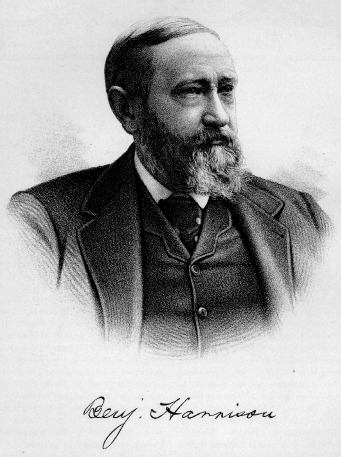decided to go to Indianapolis, which
was even at that time a town of promise. He met with
slight encouragement at first, making scarcely
anything the first year. He worked diligently,
applying himself closely to his calling, built up an
extensive practice and took a leading rank in the
legal profession. He is the father of two
children.
In 1860 Mr. Harrison was nominated
for the position of Supreme Court Reporter, and then
began his experience as a stump speaker. He canvassed
the State thoroughly, and was elected by a handsome
majority. In 1862 he raised the 17th Indiana Infantry,
and was chosen its Colonel. His regiment was composed
of the rawest of material, but Col. Harrison employed
all his time at first mastering military tactics and
drilling his men, when he therefore came to move
toward the East with Sherman his regiment was one of
the best drilled and organized in the army. At Resaca
he especially distinguished himself, and for his
bravery at Peachtree Creek he was made a Brigadier
General, Gen. Hooker speaking of him in the most
complimentary terms.
During the absence of Gen. Harrison
in the field the Supreme Court declared the office of
the Supreme Court Reporter vacant, and another person
was elected to the position. From the time of leaving
Indiana with his regiment until the fall of 1864 he
had taken no leave of absence, but having been
nominated that year for the same office, he got a
thirty-day leave of absence, and during that time made
a brilliant canvass of the State, and was elected for
another term. He then started to rejoin Sherman, but
on the way was stricken down with scarlet fever, and
after a most trying siege made his way to the front in
time to participate in the closing incidents of the
war.
In 1868 Gen. Harrison declined a
re-election as reporter, and resumed the practice of
law. In 1876 he was a candidate for Governor. Although
defeated. the brilliant campaign he made won for him a
National reputation, and he was much sought,
especially in the East, to make speeches. In 1880, as
usual, he took an active part in the campaign, and was
elected to the United States Senate. Here he served
six years, and was known as one of the ablest men,
best lawyers and strongest debaters in that body. With
the expiration of his Senatorial term he returned to
the practice of his profession, becoming the head of
one of the strongest firms in the State.
The political campaign of 1888 was
one of the most memorable in the history of our
country. The convention which assembled in Chicago in
June and named Mr. Harrison as the chief standard
bearer of the Republican party, was great in every
particular, and on this account, and the attitude it
assumed upon the vital questions of the day, chief
among which was the tariff, awoke a deep interest in
the campaign throughout the Nation. Shortly after the
nomination delegations began to visit Mr. Harrison at
Indianapolis, his home. This movement became popular,
and from all sections of the country societies, clubs
and delegations journeyed thither to pay their
respects to the distinguished statesman. The
popularity of these was greatly increased on account
of the remarkable speeches made by Mr. Harrison. He
spoke daily all through the summer and autumn to these
visiting delegations, and so varied, masterly and
eloquent were his speeches that they at once placed
him in the foremost rank of American orators and
statesmen.
On account of his eloquence as a
speaker and his power as a debater, he was called upon
at an uncommonly early age to take part in the
discussion of the great questions that then began to
agitate the country. He was an uncompromising
anti-slavery man, and was matched against some of the
most eminent Democratic speakers of his State. No man
who felt the touch of his blade desired to be pitted
with him again. With all his eloquence as an orator he
never spoke for oratorical effect, but his words
always went like bullets to the mark. He is purely
American in his ideas and is a splendid type of the
American statesman. Gifted with quick perception, a
logical mind and a ready tongue, he is one of the most
distinguished impromptu speakers in the Nation. Many
of these speeches sparkled with the rarest of
eloquence and contained arguments of greatest weight.
Many of his terse statements have already become
aphorisms. Original in thought, precise in logic,
terse in statement, yet withal faultless in eloquence,
he is recognized as the sound statesman and brilliant
orator of the day.
|




